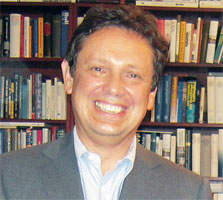Maybe he was the only true futurist-humanist
Literary agent John Brockman, Internet pioneer Jaron Lanier, science and technology historian George Dyson and computer scientist and artist David Gelernter remember Frank Schirrmacher. Frankfurter Allgemeine Zeitung. (June 13, 2014)

A visionary thinker
Schirrmacher's death is a loss that will be felt not just in Germany but throughout the world. He is irreplaceable. It's fair to say that he has no equivalent here in the United States. He was a beacon of light, a visionary thinker who initiated international conversations on the emerging questions that mattered, including the human genome, the third culture, the role of technology in a society. He will be greatly missed.
John Brockman is a literary agent. [link: faz]
Essential voice
The sudden loss of Frank Schirmacher is not only shocking, not only devastatingly sad, but also a tremendous challenge to all of us. The whole contemporary world is now missing one of its essential voices. We are challenged to find some way to continue without an irreplaceable companion.
Jaron Lanier is a computer scientist, artist and entrepreneur. [link: faz]
A class unto itself
"Isn't the financial crisis the first event where the machines have taken over?" Frank Schirrmacher wrote to me, in response to an essay co-published by FAZ and Edge in 2009. "Today I had lunch with the German secretary of Treasury to find out how far the computers and the quants were responsible for the crisis," he continued. "What he said was, that there were 5 days when nobody could explain what was happening and what would happen. At this very moment everything was dependent from the computers. "
Frank Schirrmacher's combination of convictions, intellect, and connections was in a class unto itself. Whenever he asked me to write something, I could be sure that his response (often within minutes) would be as interesting as what I had labored over for days to send to him.
Isn't it possible to conceive that before the machines become intelligent," he wrote in response to another essay, "the human being, by taking over the signals, instructions, and distraction of the computers and the web becomes not only less intelligent, but starts to communicate with his inner self in the same way the computer communicates with him? In a deep sense thinking is degenerating in a totally new way, which even makes it questionable how to teach and learn. Before the machines take over, man is surrendering.
Not without a fight—and Frank Schirrmacher was leading it.
George Dyson is a historian of science and technology. [link: faz]
A fighter for Europe
I have never known a man to fill a room with energy and optimism and pure life and sheer unreasonable happiness the way Frank Schirrmacher did. No man I've ever known combined such optimistic openness to everything good about the future with such humane kindness; with such care and attention and thought for the human beings around him. He was one of the only true humanist-futurists I've ever known. Perhaps he was the only one.
For Americans saddened by Europe's wasting, bitter cynicism, its seeming lack of confidence in its own past and future, Frank made us remember that Europe created modern culture, and therefore world culture (created science and antisepsis, surgery and abstract algebra and Degas and Matisse and the Missa Solemnis); he made us remember above all that Europe would take her place again, one day, at the head of the parade. The world needs Europe badly, now more than ever; needs Europe to inspire and to lead—and that's why the world needed Frank Schirrmacher so badly, and why this is such a sad and serious night for everyone, everywhere, who knew him. You could not help admiring him—that is true for many men; but you could not help loving him, either. And I could never help smiling when he entered the room. What is more rare and valuable than the gift of making people think of the future, think of the past, and be happy? He will be remembered for as long as Europe and European journalism stand at the center of the world of art and ideas — God willing, forever.
David Gelernter is a computer scientist and artist. [link: faz]
ON THE DEATH OF FRANK SCHIRRMACHER
MAN OF THE FUTURE
An Obituary by Gustav Seibt, Franziska Augstein and Andrian Kreye, Süddeutsche Zeitung (June 12, 2014)
[Excerpt...]
. . . Not a traditional man of culture
Schirrmacher had a large double talent: he could create new topics and get them out early. He knew—months before others knew it—what would be the language in the Federal Republic. And he was great in terms of the agreement with important people. He wrote his articles rather quickly. In addition, however, he wanted to get involved, to have his fingers everywhere. He succeeded in both.
Frank Schirrmacher was not just a traditional man of culture, although he had followed in the footsteps of two pillars of post-war cultural life in Germany, namely historian Joachim C. Fest and literary critic Marcel Reich-Ranicki. He was not only a fierce social critic of the conservative mold, He was a great journalist, having launched one of the last newspaper projects to be both successful and profitable, FAZ's weeked edition, FAS. He was one of the first "digerati," i.e. one of those 21st century intellectuals on the cusp between the humanities and natural sciences who detect a technology-driven future that opens up new worlds. But because he came from the European tradition of critical thinking, he was largely immune to the seductive euphoria that was blowing from the American shores of the Atlantic Ocean.
Sure, there seemed to be no limits to the enthusiasm with which he threw himself into the new themes. Unforgettable was the Features section of the Frankfurter Allgemeine Zeitung of 27 June 2000, in which the only thing to read on the first six pages were abstract letters of the human genome which were first completely deciphered by the biochemist Craig Venter. The headline read: "Craig Venter's last words."
The persistence with which Schirrmacher presented his themes not only continued, but the illumination from all sides, from all involved and uninvolved, was unique. Just the recent debates about the dangers of digital culture due to the monopolistic tendencies of the Silicon Valley companies, and the global spying programs of the NSA alone, showed the intellectual verve he brought to debates, illuminating the ups and downs which had been kept hidden behind impenetrable techno-jargon and a blind faith in the future. There aren't that many great critical minds in this field so far.
Journalistic Instincts
Schirrmacher not only recognized kindred spirits early, he gave them his full support: David Gelernter, Evgeny Morozov, Constanze Kurz, George Dyson, or this year's recipient of the German book seller's association's prestigious peace prize Jaron Lanier. In the pages of FAZ's Feuilleton he gave them the type of space and the continuous presence normally known only from academic journals. Still he edited them with the journalistic instincts that enabled him and his authors again and again to acquaint Central Europe's educated public life with California thinking.
This side made Frank Schirrmacher also part of the debate on the other side of the Atlant
ic. You could even encounter him in America much more often than he actually travelled there. You could for example be high above Central Park on the terrace of New York literary agent John Brockman, who is something of a global Weltgeist of science, which Schirrmacher perceived in the very Hegelian way. It happened quite a few times on occasions like this, that Brockman's cellphone would be ringing, followed by Brockman greeting the caller with a delighted "Frank!", followed by a lengthy phone conversation about the latest in evolutionary biology, behavioural economics or genetic engineering. If Schirrmacher was in hot pursuit of a topic it could happen that the cell would be ringing five, ten times a day, each call greeted by an excited "Frank!" That's when you knew that in this instance the future would arrive in Europe much faster than usual.
It was not only his insatiable curiosity and his almost childlike excitability that helped him in his search for ever new topics. He also had very powerful gift to win people over. When he met the visionary Yale computer scientist David Gelernter during prep for a panel discussion at the DLD conference in Munich in January of 2010, he immediately recognized in him one of those kindred spirits.
That's why he didn't leave it at the panel. For two days he more or less didn't leave the American scientist's side. He circled Gelernter's complex thinking first with probing questions, he discovered common thoughts and passions. A bit later he sifted through his enormous body of readily available European knowledge and was able to bring intellectual nuggets to the table himself. The encounter lead to a transatlantic friendship that enriched the pages of his Feuilleton for years to come. ...
...Protagonist of future debates
Soon it was Frank Schirrmacher not just a participant but the protagonist of debates about the future. In 2009 he published his book Payback, which became a bestseller, then The Methuselah Conspiracy, his warning of the coming generation gap of an aging society, and his book Minimum. Payback was the first intellectual engagement with the digital culture that appeared in Germany.
The subtext of his agenda: Why are we forced in the information age to do what we do not want to do, and how do we regain control over our thinking. It was one of the first great intellectual struggles with the dangers of digital technologies that did not come from the digital circles themselves, and thinking not from the strongholds of the computer scientists, but from the tradition of European humanities. It was a sharp reckoning with the zeitgeist that looked something like a promise of salvation in the digital media. And he made himself so at first not only popular.
"It is very important to emphasize that we are not talking about cultural pessimism," Schirmacher said in an interview with John Brockman, published on edge.org in autumn of 2009. "We're talking about a new technology, which is de facto a brain technology that has to do with intelligence, thus with thinking, and this new technology collides in a very material way with the history of ideas of European thinking." However, it was not holy for him. But he saw the danger that arises when one breaks with the gesture of revolution with the story. When idealism becomes ideology.
When John Brockman first learned of Frank Schirrmacher's death, he was not just sad and shocked like many others. Immediately he exclaimed: "This is a loss that will be felt not only in Germany, but all over the world. He is irreplaceable. He managed to make intellectual life in Germany trump that of America because he dared to put issues on the table that no one in America wanted on the agenda."
After Payback, his next book was Ego: The Game of Life, in which he analyzed the effects of a Internet-based world economy driven by greed. At the same time he presented an ever-sharper critique of capitalism in the once very conservative Feuilleton of the FAZ. On Thursday Frank Schirrmacher died in Frankfurt of a heart attack. He leaves his wife, an adult son and a small daughter. Not only the man will be missed, but also his many unwritten books, his unguided debates. He was 54 years old.
[German language original article.]
FAZ CO-EDITOR IS DEAD
Frank Schirrmacher Set The Central Issues Of Our Time
by Peter von Becker, Potsdamer Neueste Nachrichten (June 13, 2014)
[Rough translation:]
What is happening today in the Internet or in the biotech laboratories, raises pressing legal and moral questions. Frank Schirrmacher had the intellectual antenna and the fire of passionate journalist.
A great cultural journalist has died. The response to the sudden death of the FAZ Co-editor Frank Schirrmacher certainly shows an echo from all social, political spheres, and also far beyond the world of classical arts page. And indicative, in that what culture, what connects the arts, philosophy, the sciences and also economy and politics beyond technical borders. What is the essence of a newspaper: enlightenment.
In every work of art, it is essentially about a self-image of man, even if this explodes and the man may occur only as a shadow and fragment or dissolves in the abstraction.
To describe this analytically, is the task and stimulus of criticism. But the view of the waking columnists looks beyond the individual work and its aesthetic criteria, in the interaction of specific review and more general reflection.
Frank Schirrmacher and the ideal of enlightened people
Here the "expanded concept of culture" comes into play, which was also the passion of Frank Schirrmacher, who was originally a literary critic. Culture shapes the identity of the man who understands himself about his vegetative nature also in thought, action, dreams, hope as cultural beings. But the ideal of enlightened, competent self-reflection as to the overall reflection of the people of the world has been broken for more than a hundred years. "Universal Man," universally educated, as once were Leonardo da Vinci or even Goethe and Humboldt, able to think with the essential knowledge of the natural sciences as well as the world of humanities, of philosophy, politics, economics and the arts, is long gone, since the revolutions of technology, physics, modern medicine at the beginning of the 20th century.
One speaks of a division of the world into two cultures, in which there are the humanities and the natural sciences. However, there is also the idea of a "Third Culture." From his office on New York's Central Park, literary agent John Brockman invented the idea of a new "third culture" 20 years ago out of an earlier previously existent, but not really virulent version. And Frank Schirrmacher was one of his seismographic adepts.
Schirrmacher was a representative of a Second Enlightenment
The idea of building a new bridge to close the gap, for example, between biotechnology or nano-physicists on the one hand, and anthropologists, sociologists, lawyers or cultural philosophers, is seductive. In fact, the "third culture" is not about blurring the differences between artificial and artistic intelligence. But rather, it speaks to an extended concept of culture: a broader concept of humanity. This involves mutual knowledge and understanding.
If we not only want to know, but also want to determine how we live in the future, there must be a dialogue between cultures. Because what is happening in the Internet or in the biotech laboratories, goes beyond questions of what is technically feasible to questions that are increasingly legal, moral and social. After the impact, after blessing or curse, there are always cultural questions. It is the project of a second enlightenment, to have the intellectual antennas and the courage of the amateur (in French: the lover) and for cross-border speculation, part of the fire of passionate journalists. Schirrmacher was a candle burning from both sides.
[link: German language original article]
OBITUARY BY HUBERT BURDA
Farewell to my friend Frank Schirrmacher

FAZ co-editor Frank Schirrmacher died at the age of 54 years
[Rough translation:]
The editor of the Frankfurter Allgemeine Zeitung, Frank Schirrmacher, died at 54 years. Germany has lost a great thinker. An obituary by Hubert Burda.
Thursday last week: I had invited Frank Schirrmacher and his wife Rebecca Casati to have dinner with Michael Bloomberg, former Mayor of New York, in the "Hotel Adlon" in Berlin. Also on the list were German Finance Minister Wolfgang Schaeuble and a group of donors, philanthropists and intellectuals. Days earlier he had emailed me:
"Dear Hubert, we are looking forward to this apparently exciting evening! Yours, Frank. "
This is the last message I received from my friend, an unusually ingenious thinker, a brilliant helsman of debates that moved our country forward in the last two decades.
When he began as co-editor of the Frankfurter Allgemeine Zeitung on January 21, 1994, he was just 34 years. old. We German publishers all wondered whether it would work. Joachim Fest, his predecessor in office, and to some extent also his teacher, the legendary historian of the Nazi period and subtle art lover, could hardly conceal his skepticism.
The dashing, youthful literary editor of the FAZ (from 1989 on) who liked to pit the realism of an Ernst Jünger against the ideological literature of the day, soon became a stubborn culture czar seldom given to a moment of self doubt. Eventually, his orchestration of the Ignatz-Bubis-Martin-Walser debate in 1998/1999 made him someone that everyone was talking about. Even the international press was impressed by him.
BRILLIANT HEAD—FRANK SCHIRRMACHER
He began his career at FAZ as one of the youngest editors ever with a doctorate in literature, soon followed Marcel Reich-Ranicki as head of the literary department and finally, at only age 34 years, he took over from Joachim Fest as a publisher. His books are bestsellers.

In July 2000, we met for a long walk on the island of Rügen. He had gone through a dramatic change. After having passionately participated with great passion as a Feuilleton journalist in the affairs of literary and political life, he had morphed into a a stupendously erudite diagnostician, exploring the revolution of science and technology at the end of the last century which he was clearly fascinated by.
On 27 June 2000, the FAZ devoted six pages to the publication of the abstract set of letters of the human genome first deciphered by the genomics researcher Craig Venter. The headline: "Craig Venter's last words."
On our tour of the romantic island we talked a lot about Craig Venter, John Brockman, the New York agent who had great success in selling rights to the works of the most important scientific authors of the English-speaking to international book publishers, and of course, in his activities via the Internet. Our one-to-one talks ever since were always about the future of journalism and the fate publishers in times of Google. "Lousy pennies," nothing more was left for us by the media giant, we agreed. Our optimism for the future was mixed occasionally with anger.
Of course, Michael Bloomberg and Schirrmacher at dinner would have resulted in dazzling talk about Google, its visions of the future and attempts at transforming the lives of people. Both would have come to an agreement that rules must be established to limit global monopolies at the European and transatlantic level.
Frank Schirrmacher was an entirely new intellectual type, a non-ideologue who wasn't interested in preaching a right or left worldview. He was especially interested in the processes of social upheavals, the intellectual and technological revolutions. First of all, he wanted to understand them without any prejudice, which was what he was after.
The range of his interests was greater than that of his teachers and sometimes disciplinarians, such as Siegfried Unseld, Joachim Fest, and Marcel Reich-Ranicki. He was the first to note that because the world we live in is one of global change, for responsible journalists "culture" and "science" must be seen in a new context of applied natural sciences.
Information, communication, our thoughts and feelings are changing rapidly. Schirrmacher's concerns: In an IT-controlled environment, is there still a place for humans? Are we, as responsible citizens, capable of retaining our commitment to freedom?
I bow before a great journalist. One of the transcendent minds of our time will henceforth be the silent partner of my thinking.
[Link: Original German Language article]
Conversation
THE AGE OF THE INFORMAVORE
[10.25.09]

We are apparently now in a situation where modern technology is changing the way people behave, people talk, people react, people think, and people remember. And you encounter this not only in a theoretical way, but when you meet people, when suddenly people start forgetting things, when suddenly people depend on their gadgets, and other stuff, to remember certain things. This is the beginning, its just an experience. But if you think about it and you think about your own behavior, you suddenly realize that something fundamental is going on. There is one comment on Edge which I love, which is in Daniel Dennett's response to the 2007 annual question, in which he said that we have a population explosion of ideas, but not enough brains to cover them.
(*The term informavore characterizes an organism that consumes information. It is meant to be a description of human behavior in modern information society, in comparison to omnivore, as a description of humans consuming food. )
THE REALITY CLUB: Daniel Kahneman, George Dyson, Jaron Lanier, Nick Bilton, Nick Carr, Douglas Rushkoff, Jesse Dylan, Virginia Heffernan, Gerd Gigerenzer, John Perry Barlow, Steven Pinker, John Bargh, George Dyson, Annalena McAfee, John Brockman, David Gelernter, Evgeny Morozov
Introduction
The most significant intellectual development of the first decade of the 21st Century is that concepts of information and computation have infiltrated a wide range of sciences, from physics and cosmology, to cognitive psychology, to evolutionary biology, to genetic engineering. Such innovations as the binary code, the bit, and the algorithm have been applied in ways that reach far beyond the programming of computers, and are being used to understand such mysteries as the origins of the universe, the operation of the human body, and the working of the mind.
Enter Frank Schirrmacher, Editorial Director the editorial staff of the FAZ Feuilleton, a supplement of the FAZ on the arts and sciences. He is also one of the five publishers of the newspaper, responsible for the Feuilleton, and he has actively expanded science coverage in this section. He has been referred to as Germany's "Culture Czar," which may seem over the top, but his cultural influence is undeniable. He can, and does, begin national discussions on topics and ideas that interest him, such as genomic research, neuroscience, aging, and, in this regard, he has the ability to reshape the national consciousness.
I can provide a first-hand account of "the Schirrmacher treatment."
In May of 2000, he published a manifesto in FAZ, a call-to arms,entitled "Wake-Up Call for Europe Tech," in which he called for Europe to adopt the ideas of the third culture. His goal: to change the culture of the newspaper and to begin a process of change in Germany and Europe. "Europe should be more than just a source for the software of ego crisis, loss of identity, despair, and Western melancholy," he wrote. We should be helping write the code for tomorrow."
The Manifesto, and Schirrmacher's publishing program, was a departure for FAZ which has a somewhat conservative profile, and it was widely covered in the German press and made waves in intellectual circles. And a decade later, the national conversation continues. (See this week's Stuttargarter Zeitung).
Within weeks following publication of his manifesto, Schirrmacher began publishing articles by notable third culture thinkers such as Bill Joy, Ray Kurzweil, V.S. Ramachandran, Patrick Bateson, James Watson, Craig Venter, David Gelernter, among others. Soon after, he devoted an entire edition of the Feuilleton to a printout the Human Genome code published by Craig Venter, which caused a sensation in Germany.
Then came 9/11. And everything changed. Schirrmacher was on to the next story.
I hadn't heard from him in a while when in July he emailed me from Vietnam. He was thinking about, and researching, ideas concerning the effect of new information technologies on human knowledge, on how the Internet is modifying our cognitive structures, on how we can begin the understand the cultural changes happening in today's technology/knowledge interface. He asked for my help regarding questions he had for George Dyson, Danny Hillis, Richard Thaler, and Larry Page.
With Schirrmacher, once he's obsessed with an idea to which you may happen to be connected, expect to be kept very busy. Dozens of emails went back and forth until, finally, I caught up with him in person in October for a conversation in his Frankfurt office.
So, what are the questions Schirrmacher is asking himself?
He is interested in George Dyson's comment "What if the price of machines that think is people who don't?" He is looking at how the modification of our cognitive structures is a process that eventually blends machines and humans in a deeper way, more than any human-computer interface could possibly achieve. He's also fascinated in an idea presented a decade ago by Danny Hillis: "In the long run, the Internet will arrive at a much richer infrastructure, in which ideas can potentially evolve outside of human minds."
We discussed his notion that computer platforms can be seen as socio-biological systems which repeat three of the major concepts of the 19th century on an individual level: Taylorism (multitasking), Marxism (free content and copyright) and Darwinism (search algorithm and information foraging). "The Darwinian perspective is the most interesting," he says. "Information being an advantage for the informarvores and software that codes it with cues from foraging habits of the prehistoric man."
—JB

[ED. NOTE: The conversation was in English, Schirrmacher's second language. Rather than edit the piece for grammar, and risk losing the spontaneity of the conversation, I present it here — for the most part — verbatim.]
FRANK SCHIRRMACHER is a an influential German journalist, essayist, best-selling author, and since 1994 co-publisher of the leading national German newspaper Frankfurter Allgemeine Zeitung (FAZ), where he is Editor of the Feuilleton, cultural and science pages of the paper. He is the author of the Das Methusalem-Komplott (The Methusaleh Conspiracy), a book, published in 14 languages selling more than one million copies in Germany, on that country's aging society; and Payback: Warum wir im Informationszeitalter gezwungen sind zu tun, was wir nicht tun wollen, und wie wir die Kontrolle über unser Denken zurückgewinnen (Payback: Why in the Information Age we are forced to do what we do not want to do and how we can recover control over our thinking, November, Karl Blessing Verlag).
Frank Schirrmacher's Edge Bio Page
Event
Edge @ DLD, INFORMAVORE

Edge was in Munich for DLD 2010 and an Edge/DLD event. The event, entitled "Informavore", is a discussion featuring Frank Schirrmacher, Editor of the Feuilleton and Co-Publisher of Frankfurter Allgemeine Zeitung, Andrian Kreye, Feuilleton Editor of Sueddeutsche Zeitung, Munich; and Yale computer science visionary David Gelernter, who, in his 1991 book Mirror Worlds presented what's now called "cloud computing."
Gelernter's June, 2000 manifesto, published by both Edge and Frankfurter Allgemeine Zeitung, was at the time widely read and debated. In it, he famously wrote: "Everything is up for grabs. Everything will change. There is a magnificent sweep of intellectual landscape right in front of us."
 |
 |
 |
 |















